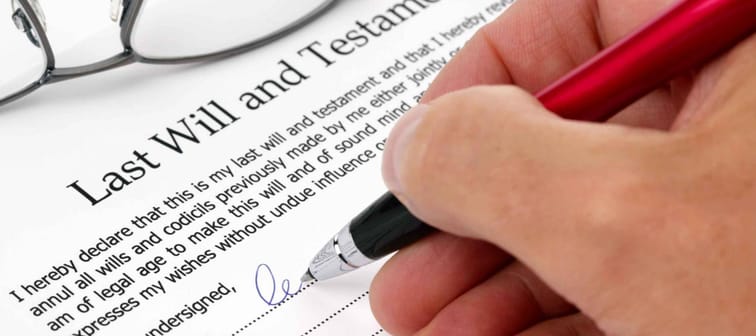What is a will?
A will is a legal document that sets out how you want to divide your estate. In the simplest terms, it spells out who gets what when you die. Your estate includes all the money and property you own (assets) and any money you owe (liabilities) on the day you die. An up-to-date will serves as a guide for your estate’s executor, the person you choose to manage your estate after your death. It's the executor’s job to follow your will’s instructions.
Before an executor takes control of an estate, most wills must pass through a court process — called probate — that verifies the will's authenticity so assets can be distributed. Probate fees vary by province: from as low as $0 in Manitoba to $15 per every $1,000 (for estates worth more than $50,000) in Ontario.
Maximize Your Tax Refund with TurboTax Canada!
Simplify tax season with this user-friendly software. Get step-by-step guidance, maximize deductions, and file with confidence. Trusted by millions, TurboTax Canada ensures accuracy and peace of mind. Start your taxes today and get the refund you deserve
Get the tax refund you deserveDying without creating a will
If you don’t have a will and didn't name an executor, a provincial or territorial court will appoint someone to manage your estate and choose your beneficiaries. If you die before your kids are adults, the court will also choose their guardian.
Dying without creating a will can cause delays and additional expenses, plus extra stress for loved ones already grieving your loss. Keep in mind, a court-appointed executor managing your estate won’t take the time to create a tax-efficient strategy for your estate. This means your estate could end up paying much more in taxes — leaving less to your loved ones.
The same policies apply to First Nations people. According to the Government of Canada, less than 9% of Indigenous people living on reserves will have a will when they die. The Indian Act determines how assets are distributed if you die on a reserve without a will.
You need a will ASAP — here are 3 ways to get it done
Do you need a lawyer to make a will in Canada? No. While hiring a lawyer is a traditional — and still highly sought after option — when creating a will, it’s not a requirement.
There are a few ways you can prepare a will. The traditional way — to hire a lawyer — is typically the most expensive, while online will and do-it-yourself will-preparation kits let you create a will for a fraction of the cost.
The key is to select an option that fits your needs and budget. To help, here are three options to create a will in Canada.
Hire a lawyer
Hiring a lawyer can be helpful if your situation is complex or if you need estate and legal advice.
For instance, creating a will using a lawyer can be helpful if you have a complicated family situation, including multiple children or children from different marriages who may challenge the will during probate. You may also want to consult a lawyer if you are a dual citizen or want to reduce taxes and probate fees.
According to Canadian Lawyer, in 2021 a simple will for an individual cost between $150 and $1,000. A more complex will, prepared and completed through a lawyer, would cost between $2,000 to $2,500. If you’re lower income, some community legal clinics can help you through the process of how to write a will.
Creating online wills in Canada
Technology has made it faster, easier and cheaper to prepare a will. There are several websites you can use to create a will, and for much less than a lawyer would charge.
The cost to create a will online typically costs between $25 to $100. Costs increase depending on your specific needs.
While cost-savings is one big advantage to creating an online will, another benefit is the speed. In most cases, you can create a will online in as little as 15 minutes.
Good options for creating a will online in Canada, include:
More: Willful lets you quickly and easily create an online will. Use promo code MONEYWISE to get 15% off any Willful plan
More: Get a legally binding will in as little as 20 minutes with Epilogue Wills
For more, read the Money.ca guide on online will services.
Write a will using a do-it-yourself kit
If you’re more comfortable putting your wishes down on paper, you can buy a DIY will kit from places such as Amazon, Indigo, Walmart and Staples.
These kits typically come with step-by-step guides and blank forms with spaces for you to fill in. The cost for these pre-prepared will packages can vary, but range from $30 to $100, depending on your needs.
Grow Your Savings Effortlessly with Moka
Automate your savings with every purchase and watch your money multiply. Moka rounds up your transactions and invests the spare change. Start building wealth effortlessly today. Join thousands of Canadians embracing financial freedom with Moka
Sign up nowIf you’re unsure how to write a will, get legal advice
Online will creation and DIY kits make it easy to prepare a will from the comfort of your home. However, there are countless examples of improperly drafted wills that end up leading to headaches, higher estate costs and fights. When in doubt, consider consulting a lawyer. It’ll cost you more upfront but down the road, you could end up saving your family a lot of time and money.
What are the requirements for a will to be valid in Canada?
There may be nuances depending on your province or territory, but generally for a will to be valid in Canada, there needs to be a physical copy. This is particularly important for people who create a will using an online will process. While you can create your will online, you can’t store it there.
You must also be over the age of majority in your province or territory and of sound mind.
Once you’ve prepared your will (and printed it off) you have to sign it in the presence of two witnesses, who also have to sign at the end of the document to confirm they witnessed your signature. Your witnesses can’t be beneficiaries, anyone who’s married to one of your beneficiaries or a minor. Choosing the “wrong” witnesses means your will could be declared invalid.
More: For all-purpose protection of your loved ones, check out life insurance in Canada
Bottom line
However you decide to prepare your will — with a lawyer, online or with a kit — don’t put it off any longer. Even if your family situation seems straightforward, fights can still break out if you don’t have a will. Not everything can be split evenly and this could lead to legal battles and strained relationships. It turns out, one of the kindest acts you can do for those you love is to create a will and clearly state your last intentions.
Sponsored
Trade Smarter, Today
With CIBC Investor's Edge, kick-start your portfolio with 100 free trades and up to $4,500 cash back.







